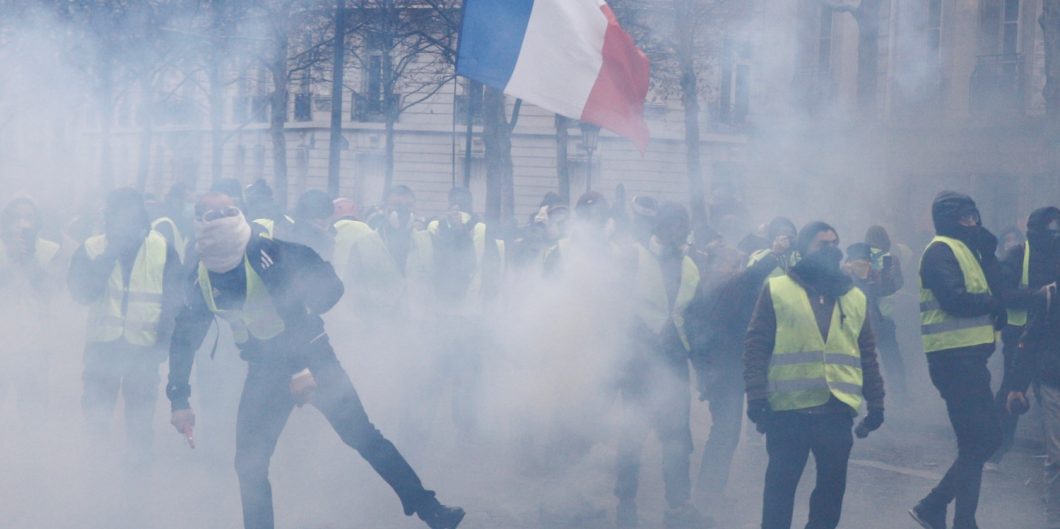No, it’s not just you. We’re all—nation-states included—in over our heads.
Faltering Democracy in France
Books on post-democracy are legion these days. So are books that explore the tension between liberalism and democracy. Two notable examples are Yascha Mounk’s The People vs. Democracy, and Law vs Democracy from the Sorbonne’s Bertrand Mathieu.
Natacha Polony writes in the same vein in her new book, Are We Still in a Democracy? Unlike Mounk and Mathieu’s works, Polony’s book is not particularly interesting in itself. But it is interesting as a case study in an emerging genre. France, like other Western countries, is seeing the rise of centrist public intellectuals who want to raise the alarm about liberalism’s excesses and the way they threaten democracy. However, they are afraid to say what they see—or even to see what they see—because they could lose their comfortable social position. Tempted to repudiate the reigning ideology because they grasp how abusive it has become, they hold back and end up stating the obvious or offering only repetitive and banal criticism. They remain just another voice in the familiar salons of the ruling classes, never saying anything that might get them uninvited. While they fret about their social standing, the synthesis of liberalism and democracy which they claim to cherish is dying.
A Crisis for Representative Democracy
Natacha Polony is mostly unknown outside France, but she is a familiar character in the theatre of France’s public intellectuals. Looking over her career, we see a textbook example of a squeamish centrist intellectual. She makes a show of calling herself a “socialist,” but like so many self-styled “socialists,” she is much more liberal than she lets on. She voted for the liberal centrist François Bayrou in 2007, who, ten years later, became President Macron’s justice minister. She is the editor-in-chief of Marianne magazine, a publication that tries to be both fashionably leftist, and also rightist, at least in defending national sovereignty. It is a house divided against itself, but that’s the point. Polony’s political brand is to make a stew of left- and right-wing ideas that is palatable for her liberal centrist colleagues to digest, without upsetting their stomachs. She has been rewarded for doing so. Since 2021, she runs a program called Polonews for one of the most important establishment television channels in France, BFM TV. Think of it as the French version of CNN; BFM TV is the main competitor of CNews (the French version of Fox), the channel where Éric Zemmour used to broadcast.
In her book, Polony purports to assess the rupture between the people and the elites. Aiming to write a timely book that exposes and dissects the problems facing the French Republic, she focuses on two contemporary events: the yellow vest protest and the so-called Covid 19 pandemic. Polony argues that the elites and the people have become separated and even opposed. This is an important and fraught topic, explored with fierce urgency across the political spectrum. For example, both Zemmour and Jean-Luc Mélenchon, the far-left candidate for the 2022 presidential election, have articulated similar ideas. Polony starts off in the right direction, but thanks to her centrist pieties, her book is a spectacular disappointment.
Polony is right to highlight the paradoxical nature of the yellow vest protest, begun when the French government tried to levy a new fuel tax that disproportionately affected those in rural France. A small crowd, less than 300,000 people at the height of the demonstrations, managed to scare the regime’s whole apparatus and receive the support of a silent and ‘delighted’ majority. It was a fiscal revolt that—as is often the case in France—led to a democratic question, a question of representation, a question of sovereignty. Polony sees the event as the French version of a now-familiar tale: elites are governing without considering popular wishes, thereby provoking a backlash. Just as Donald Trump is very American or Brexit is very British, the yellow vests protest is very French–the country is habituated to street protest. In all three cases, the lower and middle classes, upon which the stability of liberal democracy once rested, expressed the same wish: take back control.
When the house burns down, the fire must be put out and the house rebuilt; one does not propose to paint it.
Polony thinks these backlashes a tad excessive, but justifiable to some extent. She holds that they arise from two undemocratic tendencies that elites must address. First, elites are increasingly homogeneous. The much-vaunted “diversity” campaigns of the past decades, which celebrate more women and immigrants having political careers, are superficial. Just like in the US, they do not lead to a diversity of social origin amongst representatives, but rather exacerbate the social divide between rulers and ruled. Second, citizens are no longer the ones who decide the essential political questions. Instead, the task of elites has become to explain to a skeptical public why decisions that have already been taken are right for the people. For decades the essential political questions (membership in the European Union, compulsory vaccination, and others) were not presented as political questions at all. As Polony observes they were presented through the framework of “there is no alternative.” This is of course absurd. It demonstrates that citizens of Western countries have lost control; their representative institutions have ceased to function precisely as representative institutions.
Polony’s analysis is astute, and if its full import is understood, the crisis is dire. Representative democracy is on the path to extinction.
Weak Diagnoses, Band-Aid Solutions
Unfortunately, Polony’s cautious proposals for reform show she is unserious in addressing the extent of the problem. For instance, one of her signature solutions is to allow for new ways of holding a referendum. This is laughable. Referenda can easily be restricted to banal matters designed to strengthen elite power. Should we recall here that the last referendum proposed by Macron was to put “climate change” in the Constitution? The purpose of Macron’s referendum proposal wasn’t to garner action on a controversial matter or bypass partisan deadlock. In France, there is a widespread consensus on this topic. The purpose was to strengthen his own agenda and give judges tasked with interpreting the Constitution even more power (more on that below), without putting himself at any political risk. A referendum like this would do nothing to change the undemocratic structures of the regime.
To think that a referendum every now and then can save the French Republic is a little like thinking that the state of California, with its easy provisions for ballot initiatives, is only one referendum away from fixing all its problems. When the house burns down, the fire must be put out and the house rebuilt; one does not propose to paint it. Polony limits herself to superficial observations and band-aid solutions. A leftist should recognize that fiddling with the superstructure does not change the system. Once it was the hallmark of the left to be revolutionary; Polony now trades in leftist clichés while defending the status quo.
Polony fails to understand that if democracy has ceased to exist, procedural remedies will do nothing. The source of the crisis is not procedural. The problem is that citizens no longer believe in the very act of voting. Polony gives short shrift to the most alarming sign of this. The most noteworthy feature of recent French elections has been the unprecedented rates of abstention. In the last local elections in France in June 2021, the participation rate was 33% (down from 40% compared to the presidential election). Two-thirds of the electors did not come to vote. Faced with this situation, the French government may start allowing mail-in ballots, which were banned in the 1970s because of widespread fraud.
Why are the French no longer voting? Realizing that their representatives no longer exercise power in consultation with their constituents, French citizens are no longer willing to legitimize their power.
These numbers do not speak to a procedural problem, but rather a fundamental crisis of legitimacy for the French regime itself. Under the current regime, power is legitimized by the vote. Abstention is to democracy what atheism is to theocracy: people no longer believe that voting leads to a political decision and prefer to abstain. As citizens feel that they are no longer associated with political decision-making, they resort to other forms of popular expression, such as boycotts (refusing to buy is seen as being as powerful, if not more powerful, than voting) or direct demonstrations. This brings us back to the real significance of the yellow vest protest: evidence of a large-scale, possibly irreversible, loss of faith in democracy.
Covid vs Freedom
Polony’s treatment of the yellow vests is dissatisfying, but her second topic, the pandemic, is one long exercise in cowardice. Everywhere, statements that fall afoul of the public health consensus must be countered by pledges of loyalty to it. Polony is definitely afraid of conflict: afraid of offending, afraid of displeasing. This type of fear can only paralyze the intellectual. She is anxious about the assault on fundamental freedoms that is taking place across western nations; “democratic regimes have drastically limited freedom of movement.” But she justifies it: “for the good cause, of course, of saving lives.”
The heart of her complaint against liberal excesses prior to and during the pandemic is the opposition between liberalism, which she calls neo-liberalism, and democracy. The opposition between liberalism and democracy is a rich topic, the subject of some of the most important works of the past two centuries. Yet that distinction between “liberalism” and neo-liberalism, designed to shield “liberalism” from any criticism, gives the game away. She does not want to offend her liberal friends.
Polony refuses to confront the problem of liberal excesses directly because she is too attached to the liberal institutions that are undermining democratic governance. For example, while she rightly complains that the European Union is an undemocratic structure, she says not a word about the European Convention on Human Rights, tasked with enforcing the liberal human rights regime on Europe. Originally, the Convention aimed to ensure a minimum of respect for fundamental rights in each member state (prohibition of torture, prohibition of arbitrary arrests, etc.). But like “living constitutionalism” in the US, the European Court of Human Rights considers that the Convention is a “living instrument.” The Court no longer considers itself bound by the terms of the Convention. To speak of the crisis of democracy without mentioning the role of the judge is to see a splinter without seeing the beam.
If elites truly wish to save democracy, they must name the problem of judicial supremacy in Europe for what it is. They must confront and shatter the power of the judges. Perhaps that sounds too extreme. To be sure, there’s some justification for keeping judicial review as one mechanism for securing human rights. For a long time in France, it was believed that law, liberty, and democracy were the three points of the same triangle; this triangle was called “l’état de droit”—and it went hand-in-hand with the expansion of judicial review in the 1970s to defend human rights.
Yet if Polony’s exhortations are supposed to recall us to an older, better version of liberal democracy that defends law and liberty, or to make us believe that a little constitutional tinkering will solve the crisis of democracy, her work is a complete failure. Faced with the biggest civil rights crisis of our times, with officials making a mockery of rights and the rule of law in their attempts to copy China’s pandemic policies, she merely offers mild reservations. France, the land of “the rights of man,” has become a place where, as in China, a healthy population is confined. Citizens’ QR codes are checked to see if they are up to date with their vaccinations and entitled to order a coffee. This trend is only getting worse. Since Jan. 24 a third dose, called boosters, has also been necessary.
Polony’s failure is that of the intellectual elites more broadly. Centrist public intellectuals have spent years warning us that populist backlashes threaten human rights, and the very bedrock of sound liberal regimes. Faced with the supposed imperatives of biosecurity, however, we have discovered that these famous principles, enshrined in constitutional texts, are in reality little more than origami—pretty paper constructs. They are burning before our eyes. Centrist public intellectuals, ostensibly dedicated to the lifelong defense of these principles, stand idly by. Their actions preserve neither liberalism, nor democracy, and their cowardice is destroying both. We should cease to pay them any heed.



